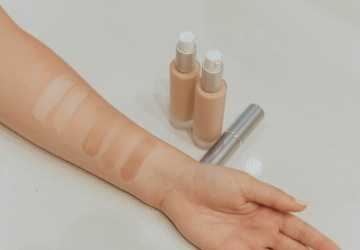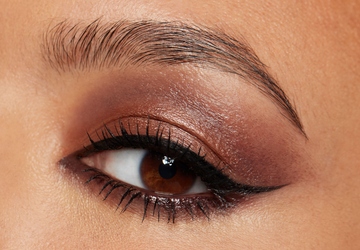10 Proven Strategies for Selecting the Perfect Foundation for Your Skin Type
Have you ever wondered why the foundation that looked perfect on your favorite celebrity didn't give you the same glow? Are you often left puzzled, navigating the sea of cosmetics, wondering which suits your skin?
Have you ever wondered why the foundation that looked perfect on your favorite celebrity didn't give you the same glow? Are you often left puzzled, navigating the sea of cosmetics, wondering which suits your skin?
Choosing the wrong foundation can lead to problems such as poor blending, incorrect skin tone match, and discomfort due to unsuitable formulas for your skin type.
Choosing the appropriate foundation for your skin type is incredibly important. We empathize with your struggles and assure you that finding the perfect foundation is more manageable than it seems.
Here, we'll share ten valuable suggestions to help you pick the perfect foundation that suits your skin needs.
Let's get started!
10 Secrets to Finding Your Perfect Foundation Match
Before we begin, it's essential to understand that choosing the proper foundation is not just about matching your skin color.
It's also about knowing your skin type, the correct formulation, and how it reacts to lighting conditions.
1.Understanding Your Skin Type
Your journey to finding the proper foundation starts with understanding your skin type. Foundations come in different formulas that cater to various skin types, such as oily, dry, combination, and sensitive.

An oily skin type might benefit from oil-free, matte foundations, while a dry skin type may need a hydrating or moisturizing formula.
Consider your skin's behavior throughout the day before you make a decision. Do you notice an oil build-up, or does your skin feel parched?
Remember, the correct base should improve your skin's inherent condition, not go against it.
2.Determining Your Undertone
Determining your skin's undertone is essential when choosing the proper foundation. Undertones fall into three categories: excellent (with hints of pink, red, or blue), warm (featuring shades of yellow, peach, or gold), and neutral (a combination of warm and cool tones).

Blue or purple veins usually indicate a cool undertone, green veins suggest a warm undertone, while blue-green veins often point towards a neutral undertone.
Selecting a foundation that complements your undertone ensures a smooth and authentic fusion with your skin tone.
3.Testing Before Purchasing
Only make the mistake of purchasing a foundation after testing it first. Cosmetics stores provide testers to help you make the best choice.
To get the most accurate match, apply a bit of the foundation on your jawline, representing your skin color more authentically than any other part of your face.
Please wait a few minutes to observe how it reacts with your skin's natural oils and color, and adjust your choice accordingly.
This step can save you from buying a foundation that looks off-key in natural light or doesn't gel with your skin's texture.
4.Coverage Preferences
Coverage refers to the opacity of the foundation or how much skin you want to show through. Foundations come in different coverage levels - sheer, medium, and complete.
Sheer coverage is lightweight and lets your skin shine through, making it ideal for good skin days or when you want a natural look.
Complete coverage is opaque and hides most imperfections, which is excellent for special occasions or if you prefer a flawless look.
Consider your lifestyle, skin concerns, and personal preferences when choosing the coverage of your foundation.
5.Oxidation Awareness
Have you ever noticed your foundation darkening a few hours after application? That's oxidation – when your foundation reacts with your skin's natural oils and air.
To avoid the dreaded oxidation, let the foundation sit on your skin for a few minutes to see if it changes color when you're testing it.
Always choose a foundation that remains consistent in color and texture even hours after application.
6.Formulation Suitability
The foundation comes in various formulations, including liquid, cream, powder, or stick. These choices depend mainly on your skin type, convenience, and personal preference.
For instance, powder foundations are great for oily skin as they can absorb excess oil and provide a matte finish.
Cream foundations are typically more affluent and provide more coverage, making them suitable for dry or mature skin.
Understand the characteristics of each formulation to make the choice that works best for you.
7.Skin Reaction Assessment
Choosing a foundation that won't cause irritation or breakouts is essential if you have sensitive skin.
Opt for hypoallergenic and non-comedogenic (doesn't block pores) formulas free from potential irritants like fragrance, alcohol, and certain chemicals.
Do a patch test before purchasing a new foundation to ensure it doesn't cause any adverse reaction.
8.Age Consideration
As we age, our skin's needs change. The foundation you loved in your 20s might not suit your 40s or 50s.
As skin matures, it can benefit from hydrating and luminous foundations that can add a youthful glow and minimize the appearance of fine lines.
Younger skin might need oil control or blemish-hiding features. It's essential to reevaluate your foundation choice as you age and your skin evolves.
9.Environmental Adaptability
Your surrounding environment and weather can influence how your foundation wears on your skin.
If you live in a humid area, you might prefer a long-lasting, sweat-proof foundation to avoid melting makeup.
In contrast, cold, dry environments might necessitate a hydrating foundation to prevent dry patches. Always consider your climate when picking your perfect foundation.
10.SPF Importance
Foundations with SPF provide an extra layer of protection against harmful sun rays.
However, these shouldn't replace your regular sunscreen as more than the foundation's SPF is often insufficient for complete protection.
Always apply a separate sunscreen if you'll be spending considerable time under the sun. That said, a foundation with SPF can be an excellent addition to your sun protection routine.
Conclusion
Selecting the perfect foundation is no longer a guessing game but an art that can be mastered with the proper knowledge.
By considering these ten tips, you can confidently make an informed decision, enhancing your natural beauty and caring for your skin in the best possible way.
We hope this guide brings you closer to finding your ideal foundation match. Remember, the proper foundation is an investment in your skin's health and confidence.
Happy Foundation Hunting!





